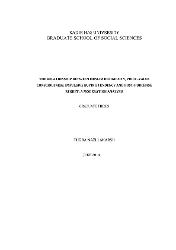The relationship between muslim religiosity price value consciousness impulsive buying tendency and post purchase regret: a moderation analysis
Abstract
Religion has been considered an inseparable part of culture. There is a considerable amount of research examining the relationship between religious affiliation and consumer behavior. Although past studies have confirmed that the religiosity and religious affiliation has an influence on consumers' consumption behavior, scholars has focused on some specific aspects of consumer behavior such as shopping orientation, media usage or purchasing behavior. To contribute new dimensions in the consumer behavior literature, this study's main aim is to understand how price and value consciousness effects: (1) impulsive buying tendency and (2) post-purchase regret regarding the transaction given Muslim religious affiliations via the use of moderation analyses. For the research, it is important to analyze participants who have high religious affiliations to test independent variables and to use members of religious Muslim society's members to make this research more reliable in the context of participants and their high religious affiliations. To test the hypotheses of this study, structural equation modeling was used to analyze data obtained from questionnaires, which were collected from a judgmental sample of 235. Results demonstrated that religiosity has a statistically significant moderating effect on impulsive buying tendency and post-purchase regret. Din faktörü, kültürün ayrılmaz bir parçası olarak görüldüğünden, tüketici davranışına olan etkisini göz ardı etmek mümkün değildir. Yapılan literatür taraması dini değer farklarının tüketici davranışını etkilediğini ortaya koymaktadır. Bu çalışmada, dini değerlerin tüketicinin plansız alışverişe olan yatkınlığı ve pişmanlık durumu üzerindeki etkisi hakkında mevcut literatür incelenmiş ve ankete dayalı bir çalışma yürütülmüştür. Çalışmanın temel noktası ise fiyat bilinci ve değer bilincinin: (1) plansız alışverişe olan yatkınlık, (2) alışveriş sonrası pişmanlık durumu gibi davranışlarının Müslüman dindarlığa sahip tüketiciler üzerindeki etkisini incelemektir. Araştırma 235 kişi ile anket usulü yargısal örnekleme kullanılarak yapılmıştır. Araştırma sonuçları dini değerlerin tüketicinin plansız alışverişe olan yatkınlığı ve alışveriş sonrası pişmanlık durumu davranışlarının ilişkileri üzerinde etkili olduğunu ortaya çıkartmıştır.
Collections
- Tez Koleksiyonu [1348]
















